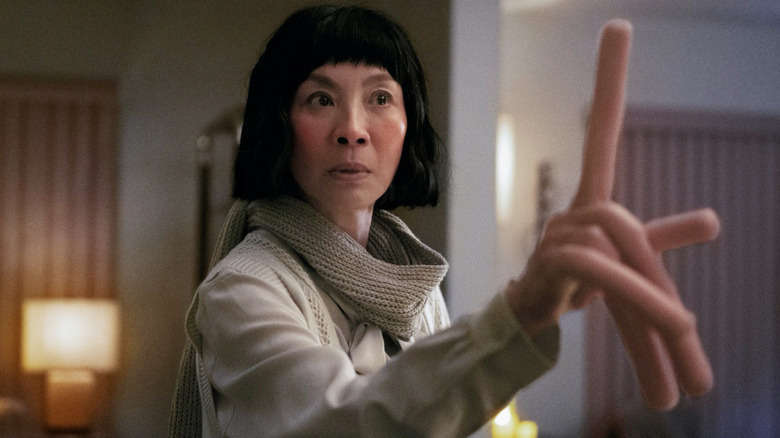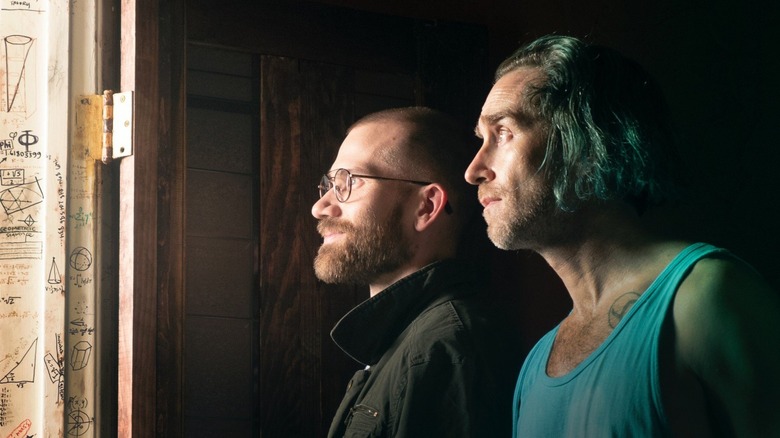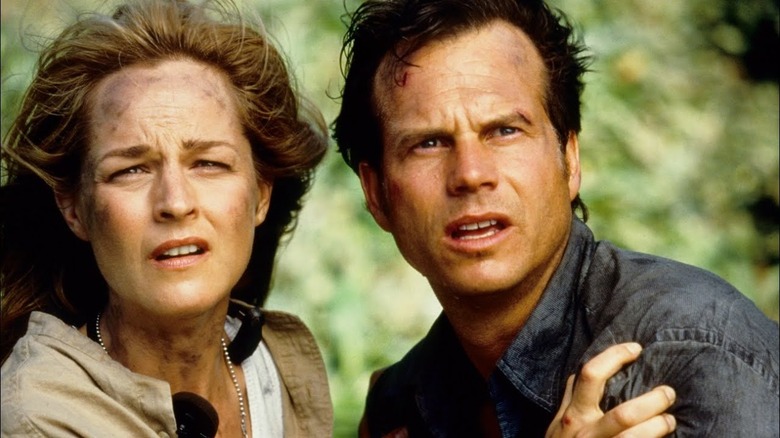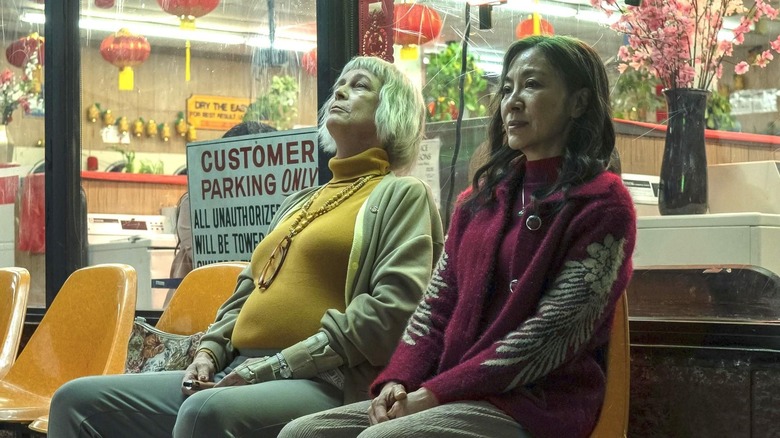Everything Everywhere Directors Making Star Wars Isn't The Problem – Studios Are
"Everything Everywhere All at Once" cleaned up at the 95th annual Academy Awards, taking home seven Oscars including the trophies for Best Picture and Best Director for Daniel Kwan and Daniel Scheinert. So, what are Daniels (as the duo is collectively known) doing next? Why making a Star War, of course!
It's a common refrain in modern Hollywood: a promising director (or directing duo) scores a hit, then immediately gets snatched up by a studio to oversee one of their franchises. Hence, it's understandable people weren't exactly thrilled to learn Daniels are working on "Skeleton Crew," an upcoming live-action "Star Wars" streaming series that takes place concurrently with "The Mandalorian" and its spinoffs. Is this the minds who gave us Daniel Radcliffe: Farting Corpse and a universe where everyone has hotdog fingers leaving their days of being legitimately weird and innovative behind them? In a subsequent Instagram story post (via The Playlist), Daniel Kwan was quick to assure everyone that's not the case:
"Lol, all of the people @ing us about getting sucked up by the 'corporate machine' can chill. These headlines are always misleading. Don't worry. We aren't working on a whole series, we guest directed one episode. [Creator] Jon Watts approached us to do an episode awhile ago (before 'EEAAO' even came out). We love Jon, love 'Star Wars,' love learning new tech, we love meeting new cast and crew, and we needed the days to keep our healthcare (!!!) so it was an easy yes. We shot it last year and had an incredible time working with the most talented cast and crew and [I'm] excited for you all to see it."
Building on Kwan's response, the problem isn't still-up-and-coming directors wanting to make a Star War; it's studios wanting them to only make a Star War.
One for them, another one for them
"One for them, one for me" might be a cliché in Hollywood, but it's easier said than done these days. For every filmmaker who get the chance to play in a sandbox of their own invention in-between tentpoles (Example: James Wan), there are countless others who seem to get sucked up into the "corporate machine" Daniel Kwan (sorta) joked about, much like the alien's victims in Jordan Peele's "Nope." Peele himself has said he would prefer to avoid "pre-existing material" in favor of directing "original stuff." However, one suspects he, too, is wary of being pulled into the "corporate machine," when reading between the lines of his UFO thriller.
It all comes down to studios refusing to hire filmmakers for anything but IP projects. Justin Benson and Aaron Moorhead ("Something in the Dirt") successfully injected "Moon Knight" with a welcome dose of strangeness, to which Disney and Marvel responded by ... hiring them to helm "Loki" season 2. Joachim Rønning and Espen Sandberg ("Kon-Tiki") steered "Pirates of the Caribbean: Dead Men Tell No Tales" into port, so the House of Mouse entrusted Rønning with "Maleficent: Mistress of Evil." Even Tim Burton, who's delivered multiple hits over 40 years of collaborating with Disney, has grown disillusioned with the company, calling it "a horrible big circus."
Disney's far from the only guilty party in this situation. Has Universal ever really considered letting Justin Lin make anything other than "Fast & Furious" sequels since he broke out with "Better Luck Tomorrow"? Will Paramount allow John Krasinski to work on something unrelated to "A Quiet Place" anytime soon? Does Sony intend to work with Adil & Bilall on a project other than a "Bad Boys" sequel? Pardon my cynicism, but I think we all know the answer.
Have a little originality, as a treat
When /Film's Ben Pearson interviewed Dan Trachtenberg about his movie "Prey" last year, the latter agreed with his assessment that filmmakers find themselves "increasingly having to smuggle their ideas and interests into a larger property in order to get these stories told at all." In the case of both Trachtenberg's "10 Cloverfield Lane" and "Predator" prequel, things worked out nicely. Each film stands on its own, connections to their respective franchises be damned. "Prey" even manages to build upon the themes of the first "Predator," blending them with those of an anti-colonialist Western that provides some much-needed representation for Indigenous Americans.
At a certain point, though, this backdoor approach to originality starts to become exhausting and convoluted. Take the upcoming "Twisters," a new entry in the "Twister" franchise. The film is being directed by celebrated "Minari" helmer Lee Isaac Chung and is said to be partly inspired by his own real-life experiences growing up in tornado country in rural Arkansas (via Deadline). In fact, it might not even be a sequel, with recent reports describing "Twisters" as "a new story" devoid of any returning characters from Jan de Bont's 1996 blockbuster. So why does this have to be associated with "Twister" at all? And at what point does its ties to that IP become more of a drawback than a benefit?
Perhaps Chung is fortunate he can even get such a personal take bankrolled by a major studio in this day and age. Filmmakers like David Lowery have seemingly made their peace with knowing they'll have to turn to the likes of A24 to get their non-franchise offerings going. If you're Destin Daniel Cretton or Ryan Coogler, you might even luck out and find pre-existing, studio-friendly material that speaks directly to your interests.
The illusion of choice
There's an obvious rebuttal to this — namely, nobody works on a franchise these days expecting the studio behind it to greenlight their passion project in return. Daniel Kwan confirmed in his Instagram story he and Daniel Scheinert already have their next film in mind and it's an "original [D]aniels project," suggesting their one-off trip to a galaxy far, far away will remain precisely that. Besides, as Kwan highlighted in his message, indie filmmakers aren't necessarily reaping in the big bucks themselves. One certainly cannot fault Daniels for deciding they would rather make a Star War than have to forgo healthcare in the middle of a pandemic ... or even making one simply because they love the property.
It all comes down to a matter of choice, or the lack thereof. Filmmakers like Daniels should be free to choose whatever projects they deem of interest, but it's not really a choice if the options are "Work on a franchise or go somewhere else." Very few directors are allotted the creative freedom of a Christopher Nolan, who can lock down nine-figure budgets to make period pieces that experiment with narrative conventions in-between crowd-pleasing spectacles. Even someone as established as M. Night Shyamalan has been forced to resort to self-financing to get his original projects backed by a major Hollywood player. Moreover, the way studios have been throwing money around of late, you'd think they'd be willing to take an actual creative risk now and then.
If it sounds like I'm going in circles, it's because I know better than to assume there's a simple solution to such an industry-wide problem. So maybe just remember: Don't hate the players, hate the game. In this particular case, we might even get a great "Star Wars" show out of it.



